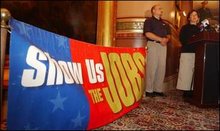On yesterday's "Vermont This Week" (9-7-07), Mr. Roper (chair of the VT GOP) said that "the biggest expense that Vermonters are facing right now is the cost of their taxes".
That is inaccurate. A simple calculation shows that for a median income family with a median priced home, state & local taxes represent about 6% of their household budget, while transportation, housing, and food are all more than 13% each and health care is another 10% (even assuming an employer contribution). [Note: Sales taxes were not calculated separately but are typically 1% - 2% of gross income).
Using data from the VT Tax Department, the net school tax would be about 2.4% of gross income; state income tax 1.9%; and non-education municipal tax 1.6% (avg. statewide). Although not insignificant, do these look like "the biggest expense that Vermonters are facing right now"?
Elected officials, candidates, and their spokespersons should be held to a high standard for accuracy and truth. And reporters should not simply allow such falsehoods to be repeated. Mr. Roper's statement should be corrected.
I suggest that VPT, WPTZ, and other major media outlets seriously consider a regular feature (especially during campaigns) that examines such statements and report when they are found to be inaccurate or misleading.
We expect elected officials, candidates, and their spokespersons to engage in spirited debates about the issues. But voters deserve to know the truth. Some might argue that rival campaigns should respond in such cases. But how are voters to know the difference between opinion and fact unless the media holds them accountable? With respect, I always thought that was part of the job.
Doug Hoffer
To the editor, Reformer:
Re. your recent article on the proposed income tax for education ("Income tax plan weighed; panel seeks to fund education system", Reformer Aug. 21, 2007).
The article quoted the Governor's spokesman Jason Gibbs saying that shifting to an income-based system would discourage businesses from relocating to Vermont, thereby "undermining Vermont's economic security."
It would be helpful if Mr. Gibbs would provide evidence to support that assertion. Other than self-serving anecdotes from certain business advocacy groups, there is no data to back up their claims. Indeed, the academic literature has found consistently that state taxes are a very small part of business costs and that they have little impact on location decisions.
Furthermore, an income tax for education would not be an additional tax; it would simply replace the property tax.
For those interested in the subject, I suggest you read Vol. 1 of the Tax Study published by the Joint Fiscal Office. On page 58, it shows that 46% of the largest multi-state and multi-national firms operating in VT paid only $250 in corporate taxes in 2003. Does that sound like a burden to you?
As for the personal income tax, much is made of the fact that Vermont has a high top marginal tax rate. But only 1% of all filers pay at that rate, which only kicks in for earnings over $336,550. I wish I had such problems.
Opinion is one thing, but when people make statements that purport to be factual and have no basis, that's just dissembling and demagoguery.
Doug Hoffer
Subscribe to:
Post Comments (Atom)

No comments:
Post a Comment